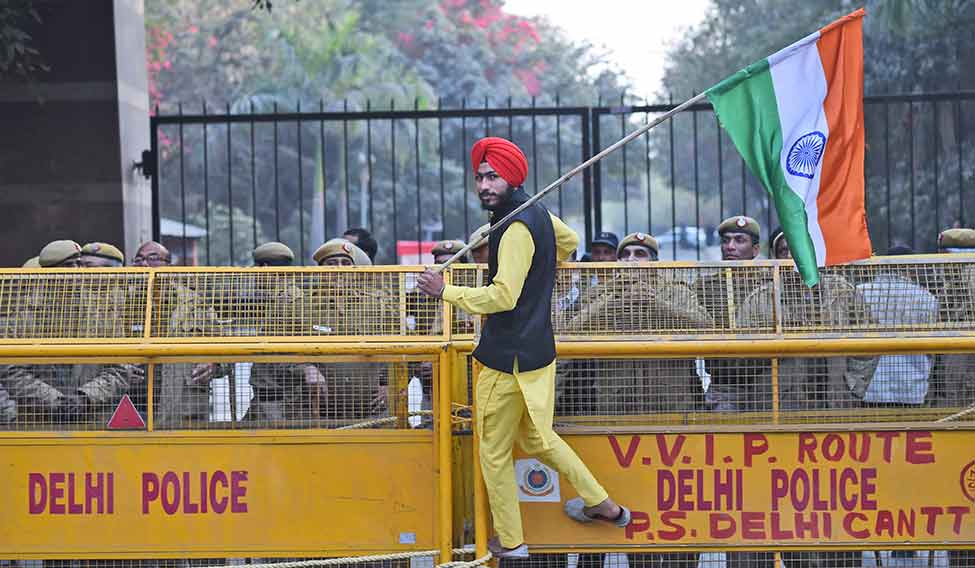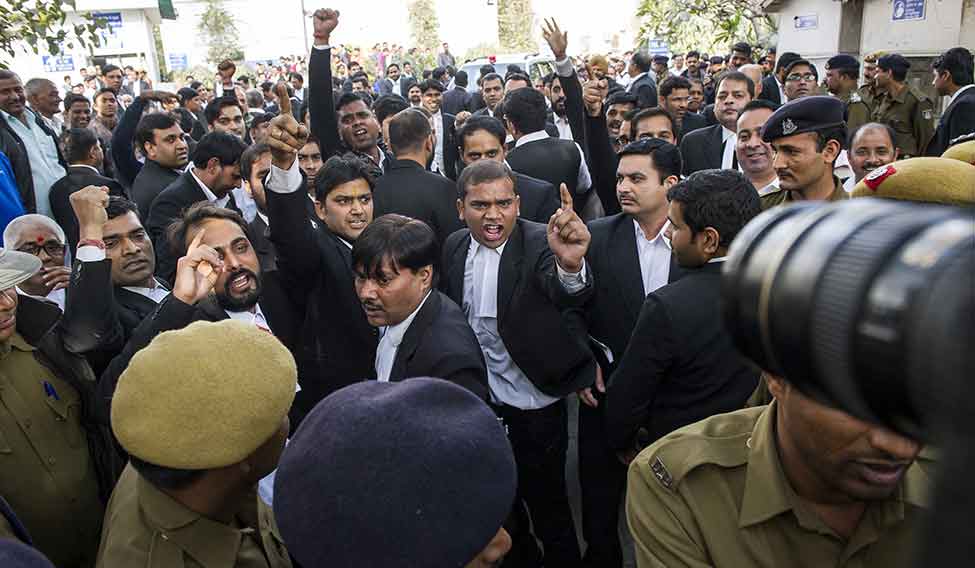It has been more than a week since the Jawaharlal Nehru University in Delhi became the centre of a political storm. The main entry to the sprawling campus is now heavily barricaded. A few hundred metres inside the gate, a wall near the popular KC market displays a large, colourful political cartoon. The evening sun shines on the sundry pamphlets and posters plastered on walls at several places.
The Ganga dhaba, where students have discussed hot-button issues over steaming cups of tea since 1985, appears to be back in business. The huddles, however, are much smaller. The air of apprehension is palpable.
A few members of the Akhil Bharatiya Vidyarthi Parishad (ABVP), a student union backed by the BJP, raise nationalist slogans as television crews look on. Classes have been cancelled for the day. A trio of girls from the northeast, all of them into their second year of master’s in literature, wonder what to tell their parents back home about the situation.
The trouble started on February 9, when a group of students organised a cultural programme to mark the third death anniversary of Afzal Guru, who was hanged for his involvement in the 2001 Parliament attack. The event sparked a row, with the ABVP staging a protest demanding the expulsion of the organisers. According to the ABVP, the students who participated in the event raised anti-India and pro-Pakistan slogans. The organisers, however, denied it, saying none of them were part of the group that raised such slogans. On February 13, JNU Students' Union president Kanhaiya Kumar was arrested and charged with sedition.
“With this issue, the perception of JNU students being anti-national might build up, which could lead to us not getting the jobs we want. Daily life [in the campus] is getting affected. Our friends in the city say rickshaws are refusing to come to JNU. In neighbouring Munirka, landlords are making it difficult [for students] to rent [rooms to stay],” said one among the trio of northeast girls.
According to Sunil Ambekar, national organising secretary of the ABVP, the issue is about students wanting to become active participants in the country’s development. “Students should be stakeholders and responsible. But certain organisations are provoking their minds and, as a result, some are joining hands with groups from Kashmir, separatists, Naxals…. There is no place for such voices and we won’t tolerate them,” he said.
Is there any information on such groups and their activities on the campus? “We have said that they aren’t discussing capital punishment,” said Ambekar. “Instead, they are worshipping people like Afzal Guru, and making them heroes.”
The JNU row has snowballed into a national issue, thanks to a series of incidents and comments by leaders across the political spectrum. On February 14, Union Home Minister Rajnath Singh alleged that the “JNU incident has the support of Lashkar-e-Taiba chief Hafiz Saeed”. The following day, a group of lawyers at the Patiala House court roughed up teachers, students and journalists.
The situation remained volatile on February 17, when lawyers attacked Kanhaiya Kumar when he was brought to the court. Kumar, whose custody has been extended to March 2, is said to have sustained internal injuries. Witnesses said the police did not intervene to put an end to the violence.
Taking note of the events, the Supreme Court appointed a panel of eminent lawyers—comprising Kapil Sibal, A.D.N. Rao, Dushyant Dave, Rajiv Dhawan, Ajit Sinha and Harin Rawal—to inquire into the matter. Sibal was confronted by a mob who raised nationalist slogans and threw stones at him.
The panel is said to have told the Supreme Court that Kumar’s life is in danger. With pressure mounting on the Centre to diffuse the crisis, the home secretary has reportedly asked the Delhi Police to give a report on the ground situation.
 Obstacle course: An activist outside the heavily barricaded entrance to JNU | Getty Images
Obstacle course: An activist outside the heavily barricaded entrance to JNU | Getty Images
Academicians in India and abroad have lent their support to Kumar and those who are with him. Eminent persons like Noam Chomsky and Orhan Pamuk have issued a statement condemning the government action on campus. CPI(M) general secretary Sitaram Yechury (himself an alumnus of the institution) and Congress vice president Rahul Gandhi have criticised the way the Union government had handled the issue.
Still, what really happened at JNU on February 9 remains unclear. According to Amrita Pathak, a PhD student and national council member of the All India Students Federation, it was a “breakaway group” that decided to commemorate Afzal Guru’s hanging. “Many people on campus attend such events. There were other groups that day, including the ABVP, who were sloganeering. A first-year arts student felt it could lead to a riot, so he called Kanhaiya Kumar, who came to try and restore order. The march and sloganeering continued till the students reached Ganga dhaba, where we saw police personnel. It was surprising to see a TV crew alongside us. Some people raised slogans against the police, and the police said, ‘It is strange that you call us yourself and then shout against us.’ They surrounded Kanhaiya…. Looking back, it seems the ABVP had planned the whole thing and called the media and the police…. We don’t know who raised anti-India slogans.”
Prakash Kumar, a PhD student from Uttar Pradesh, said the crackdown was bound to happen sooner or later. “Several teachers and students have been voicing their thoughts against the current government…. Earlier, the ABVP was quiet; now their voices are louder. The police have been raiding hostels. The RSS has been given a free hand. It is depressing to see an atmosphere of fear being created.”
The attempt to create an atmosphere of fear is, perhaps, what led to the violence at the Patiala House court on February 15. “One of our professors was attacked and abused in Hindi by a man dressed as a lawyer,” said Ashish Agnihotri, council member of the JNU Teachers Association. “Another professor, Ayesha Kidwai, was molested. The police were a mute bystander.”
Professor B.S. Butola likened the situation to the Emergency. “I have been here since the 1970s, and have never seen political victimisation or a police crackdown this way on this campus,” he said. “Freedom of ideas is being attacked. It feels like it was a well-planned strategy, and we fell into their trap.”
Activist Ram Puniyani said the government was trying to suppress the progressive liberal character of the university. “The ruling party wants the ABVP to promote its politics,” he said. “The events and the methods of the government are totally opposite of what a democratic setup should have.”







